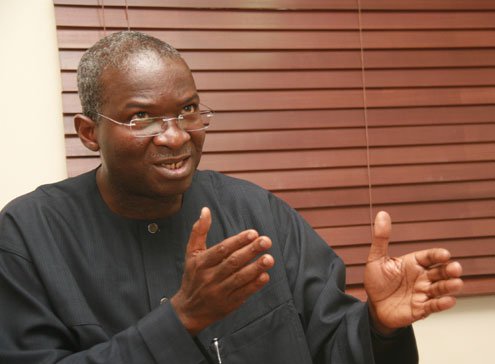The Minister of Works and Housing, Mr. Babatunde Fashola, has asked Nigerians to expect significant drops in the prices of food consumed across the country.
He noted that although the price of food was still high, it was expected to come down significantly as supply increased, adding that this would be possible from improved food production in the country.
A statement issued yesterday from the minister’s office, explained that he made these comments when he hosted a United Nations Industrial Development Organisation (UNIDO) delegation led by the Representative to the Economic Communities of West African States (ECOWAS) and Regional Director, Nigeria Regional Hub, Mr. Jean Bakole.
At the meeting with the UNIDO team, Fashola, equally noted that the federal government was committed to the renewal of Nigeria’s national infrastructure. He said this would make Nigerians happy.
Citing a data from the August 2019 selected food price watch of the National Bureau of Statistics (NBS), statement stated that the average price of one dozen of medium sized eggs decreased year-on-year by 2.58 per cent and month-on month by 1.37 per cent to N461.89, while the average price of one kilogramme of rice (imported high quality sold loose) decreased year-on-year by 4.91 per cent and increased month-on-month by 0.14 per cent to N356.61 in August 2019 from N356.10 in July 2019.
Similarly, the average price of one kilogramme of yam tuber decreased year-on-year by -35.13 per cent and increased month-on month by 11.23 per cent to N190.04 in August 2019 from N170.85 in July 2019.
However, Fashola explained that the government’s commitment to agriculture was yielding results in terms of increase in food production such as rice and cereal.
He added that although the price of food was still high, it was expected to come down significantly as supply increased.
According to him, with the increase in food production, Nigeria was now supplying not only to local markets but to international markets such as the north and central African sub-regions.
The minister stated that the government would be glad to, “see more projects in manufacturing and all of that. Those are at the heart of helping the economy grow in small and medium businesses.”
He also noted that because of the understanding of the capacities and contributions of small businesses to Nigeria’s Gross Domestic Product (GDP), it would support them with clear government policies through institutions like the Bank of Industries and Ministry of Trade and Investments.
He said the ministry of finance was developing fiscal policies to give relief to small businesses in the country which would come in terms of the way they pay their taxes.
According to him, such fiscal supports could be seen in the way the current increase in Value Added Tax (VAT) was structured by the government in favour of small businesses.
On infrastructure develo-pments, he said renewal of the roads, bridges, rails, airports and seaports in the country meant that, “in the shortest possible Nigerians will sing a new song.”
He however stated: “The truth is that the rate at which our household has grown has not been matched by the rate at which our infrastructure is growing, and this administration understands that.
“The Nigerian household has grown, and we need to build a new infrastructure not only to accommodate those who are currently in the house but those who are on their way.”
Fashola equally requested the UNIDO to spend the $60 million it has mapped out for investment in about nine sectors in the country, to a few critical areas that would be more impactful to the needs of Nigerians.
“Sixty million US dollars is a huge amount of money. But it is not the money that is the issue but how it is being used. My thoughts are that instead of spreading this money thin over a large area, as you said, why not use it on one or two projects that could be impactful to the people,” he said.
In his remarks, Bakole, told Fashola that the $60 million had been earmarked for investments in agriculture and agro-based businesses, trade and capacity building, housing and construction, infrastructure development, energy and environment.



